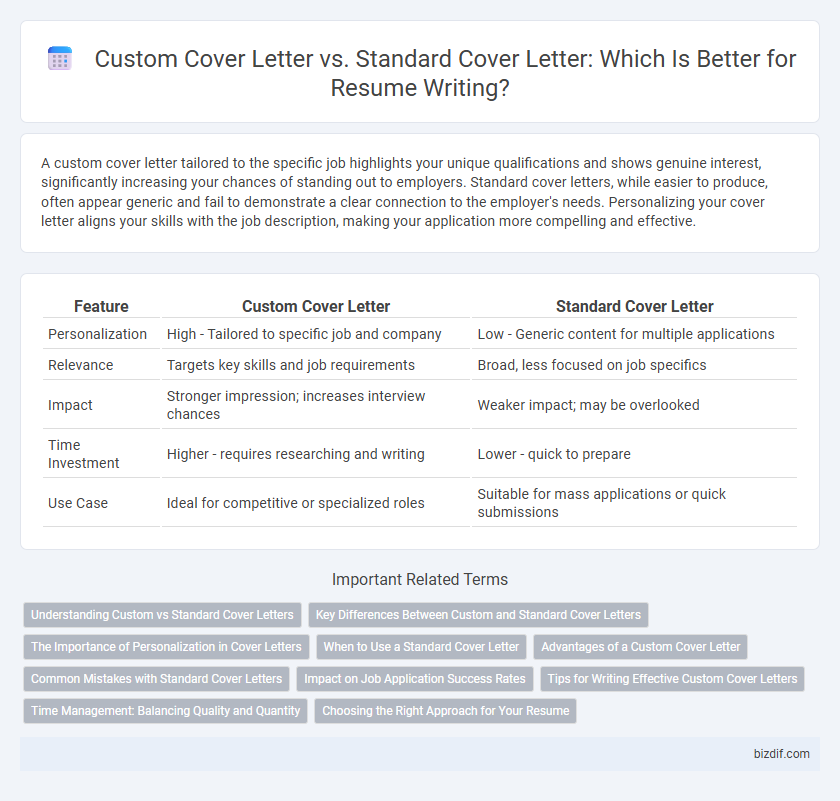A custom cover letter tailored to the specific job highlights your unique qualifications and shows genuine interest, significantly increasing your chances of standing out to employers. Standard cover letters, while easier to produce, often appear generic and fail to demonstrate a clear connection to the employer's needs. Personalizing your cover letter aligns your skills with the job description, making your application more compelling and effective.
Table of Comparison
| Feature | Custom Cover Letter | Standard Cover Letter |
|---|---|---|
| Personalization | High - Tailored to specific job and company | Low - Generic content for multiple applications |
| Relevance | Targets key skills and job requirements | Broad, less focused on job specifics |
| Impact | Stronger impression; increases interview chances | Weaker impact; may be overlooked |
| Time Investment | Higher - requires researching and writing | Lower - quick to prepare |
| Use Case | Ideal for competitive or specialized roles | Suitable for mass applications or quick submissions |
Understanding Custom vs Standard Cover Letters
Custom cover letters are tailored specifically to the job description and company, highlighting relevant skills and experiences to align with employer needs, which significantly increases the chances of catching a recruiter's attention. Standard cover letters use a generic template that can be sent to multiple employers but often lack specific details that demonstrate genuine interest and fit for the role. Understanding the distinction between custom and standard cover letters is crucial for job seekers aiming to create a compelling narrative that differentiates them in a competitive job market.
Key Differences Between Custom and Standard Cover Letters
Custom cover letters are tailored to specific job descriptions, incorporating relevant keywords and showcasing alignment with the company's values, while standard cover letters follow a generic format with limited personalization. Custom letters emphasize unique qualifications and experiences that match the job requirements, increasing the chances of passing Applicant Tracking Systems (ATS). Standard cover letters often lack targeted content, resulting in lower engagement from hiring managers and reduced interview opportunities.
The Importance of Personalization in Cover Letters
Personalization in cover letters significantly increases the chances of capturing a hiring manager's attention by directly addressing the specific job requirements and company culture. Custom cover letters demonstrate genuine interest and effort by tailoring skills, achievements, and experiences to align with the targeted role, unlike standard cover letters that use generic language. Employers prioritize candidates who exhibit this level of detail and relevance, making personalized cover letters a critical factor in successful job applications.
When to Use a Standard Cover Letter
Standard cover letters are best suited for mass job applications or when responding to general job postings without specific role details. They provide a consistent introduction to your skills and experience, saving time when applying to multiple positions across the same industry. Use a standard cover letter when customization is not required or feasible, maintaining professionalism while emphasizing relevant qualifications.
Advantages of a Custom Cover Letter
A custom cover letter significantly enhances your chances of landing an interview by tailoring your skills and experiences to the specific job description, demonstrating genuine interest and attention to detail. It allows for the inclusion of targeted keywords that Applicant Tracking Systems (ATS) prioritize, increasing resume visibility. Employers value personalized applications as they reflect a candidate's commitment and alignment with company culture and job requirements.
Common Mistakes with Standard Cover Letters
Standard cover letters often suffer from generic language and lack personalization, which fails to capture the hiring manager's attention or highlight candidate-specific skills. Common mistakes include using a one-size-fits-all approach, neglecting to address the company's unique values and job requirements, and omitting measurable achievements that demonstrate qualifications. These errors reduce the letter's effectiveness and decrease the candidate's chances of progressing in the hiring process.
Impact on Job Application Success Rates
Custom cover letters tailored to specific job descriptions significantly increase job application success rates by demonstrating genuine interest and aligning skills with employer needs. Standard cover letters tend to have lower impact, as generic content fails to capture recruiters' attention or address key qualifications. Data shows applicants using tailored cover letters experience up to 50% higher callback rates compared to those using generic templates.
Tips for Writing Effective Custom Cover Letters
Crafting an effective custom cover letter requires tailoring content to the specific job description, highlighting relevant skills and accomplishments that directly address the employer's needs. Incorporate keywords from the job posting to optimize Applicant Tracking System (ATS) compatibility and demonstrate attention to detail. Keep the tone professional and concise, emphasizing unique qualifications and enthusiasm for the role to increase the chances of landing an interview.
Time Management: Balancing Quality and Quantity
Custom cover letters require more time investment but significantly improve application success rates by addressing specific job requirements and company culture. Standard cover letters save time but often lack the personalized touch that employers seek, reducing the chances of standing out in competitive job markets. Effective time management in resume writing balances creating tailored cover letters for key opportunities while using well-crafted templates for less prioritized applications.
Choosing the Right Approach for Your Resume
Custom cover letters tailored to the specific job description and company culture significantly increase your chances of standing out to hiring managers compared to standard cover letters that use generic language. Highlighting relevant skills, experiences, and achievements directly aligned with the job posting demonstrates genuine interest and a clear understanding of the role. Employers prefer resumes accompanied by personalized cover letters because they reveal a candidate's effort and attention to detail, which are critical factors in the selection process.
Custom cover letter vs standard cover letter Infographic

 bizdif.com
bizdif.com